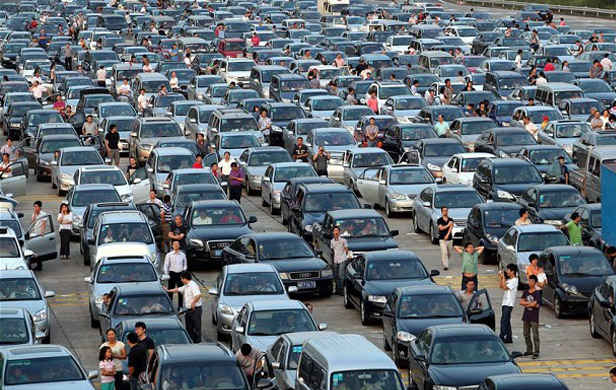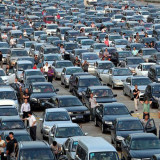
In railing against everything from bike lanes to transit spending, pundits and politicians often raise the spectre of a “war on cars.” Of course, there is no war on cars – but there should be.
Cars directly kill and hurt more people every year than most diseases, resulting in 1.5 million deaths and 78 million injuries needing medical care, according to the World Bank. Road injury is the eighth leading cause of death worldwide. Pollution from cars also causes acute and chronic health problems that often result in premature death – from heart disease and stroke to respiratory illness and lung cancer.
Emissions from cars double since 1970
Environmental impacts of cars are also well-known and wide-ranging, including climate change, smog and oily run-off from roads, not to mention the green space sacrificed for infrastructure to sell, drive, fuel and park them. Despite fuel-efficiency improvements, emissions from vehicles have more than doubled since 1970, and will increase with rising car demand in countries like China, India and Brazil, according to the latest Intergovernmental Panel on Climate Change report.
Time for a recall
Because many people, especially North Americans, can’t conceive of a world without cars for everyone, we overlook major problems caused by our private automobile obsession. We’re rightly outraged when a company like General Motors ignores faulty ignition switches in some of its vehicles, thought to have caused 13 deaths over 13 years. The massive recall that followed was justified and necessary. But as a headline on Treehugger’s website argues, “It’s time for a bigger recall of a seriously defective product: The Car.”
The article continues:
Since we can’t recall every car all at once and redesign the entire country, there are at least things we can do to make it less [quote]bad. Significantly reduce speed limits. Make drivers pay the full cost of infrastructure construction and maintenance through the gas tax. Build the cost of medical care for those millions of injured by cars into the price of gas. Invest in walkable cities and alternative forms of transport.[/quote]
Seattle newsweekly The Stranger, only somewhat tongue-in-cheek, created a 2011 manifesto for a real war on cars. “We demand that car drivers pay their own way, bearing the full cost of the automobile-petroleum-industrial complex that has depleted our environment, strangled our cities, and drawn our nation into foreign wars,” it says.
[quote]Reinstate the progressive motor vehicle excise tax, hike the gas tax, and toll every freeway, bridge, and neighborhood street until the true cost of driving lies as heavy and noxious as our smog-laden air.[/quote]
Drivers need better alternatives
As Treehugger notes, we can’t shift from car-centric societies overnight. And until we find ways to better design our urban areas, many people will continue to rely on cars. After all, in the “developed” world, and increasingly in the developing world, we privilege private automobiles when creating infrastructure, often at the expense of what we need for public transit, walking and cycling.
Car and oil companies bought and dismantled public transit
Some even claim automobile and oil companies bought and dismantled streetcar and urban rail lines from the mid-1930s to the 1950s to sell more cars and oil. Fuel efficiency wasn’t a concern because, before pollution and climate change impacts were known, gas sale profits were a priority. Many factors were involved in the development of car culture, but we now find ourselves in an era when much of our oil is burned to propel mostly single users in inefficient vehicles.
Only 15% of fuel used to power vehicle
Even with today’s improved fuel standards, only about 15 per cent of the energy from each litre of fuel burned is used to move the vehicle, which typically weighs 10 to 20 times more than the passenger(s) it carries. That translates to about a one per cent efficiency to move those passengers.
Although we can’t stop using cars altogether, we can curtail their damage to people and the environment. We can reduce greenhouse gas emissions by cutting back on car use, choosing fuel-efficient vehicles, joining a car pool or sharing program and reducing speed. At the policy level, we need increased investment in public transit and cycling and pedestrian infrastructure, stronger fuel-efficiency standards, reduced speed limits, higher gas taxes and human-centric urban design.
Besides combatting pollution and climate change, reduced dependency on private automobiles will lead to healthier people, fewer deaths and injuries and livable cities with happier citizens. And that’s worth fighting for!
With contributions from David Suzuki Foundation Senior Editor Ian Hanington.


A tax credit for not driving !! and insurance rates that go by gvw ,so the monster truck owners feel the pinch.. If people walked more than drove ,all sorts of health problems would lessen or disappear, BUT it will never happen cause its all about MONEY not health.
I walk the main roads and find many dead animals, killed by vehicles, the number of dead animals across all roads in our country must be all but unimaginable!